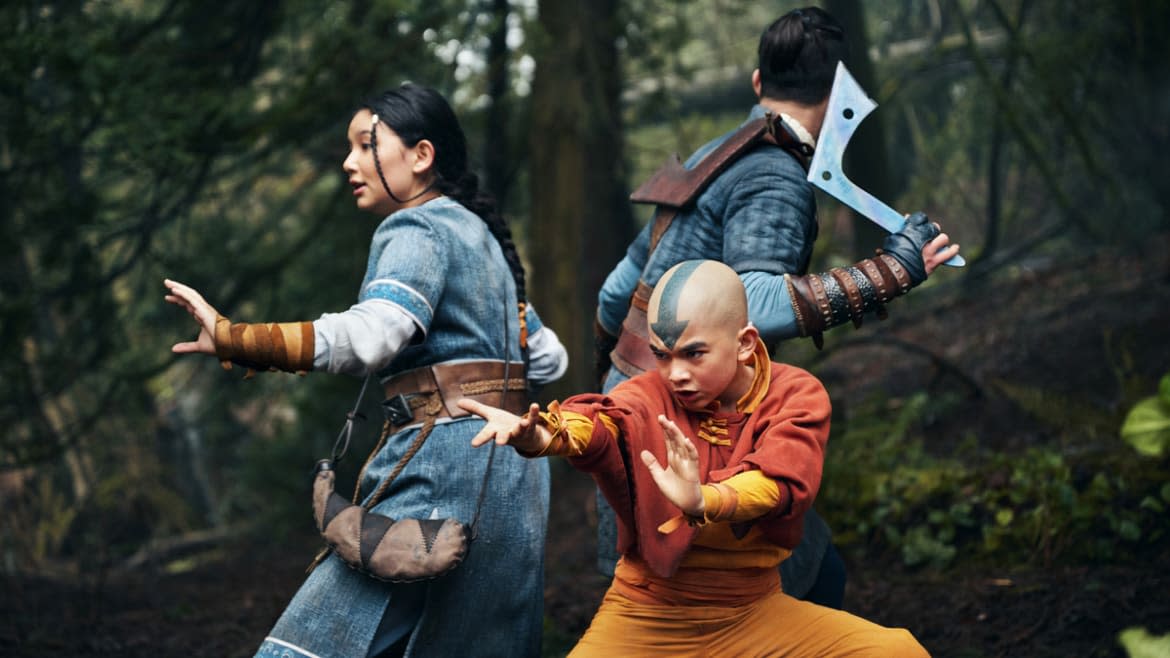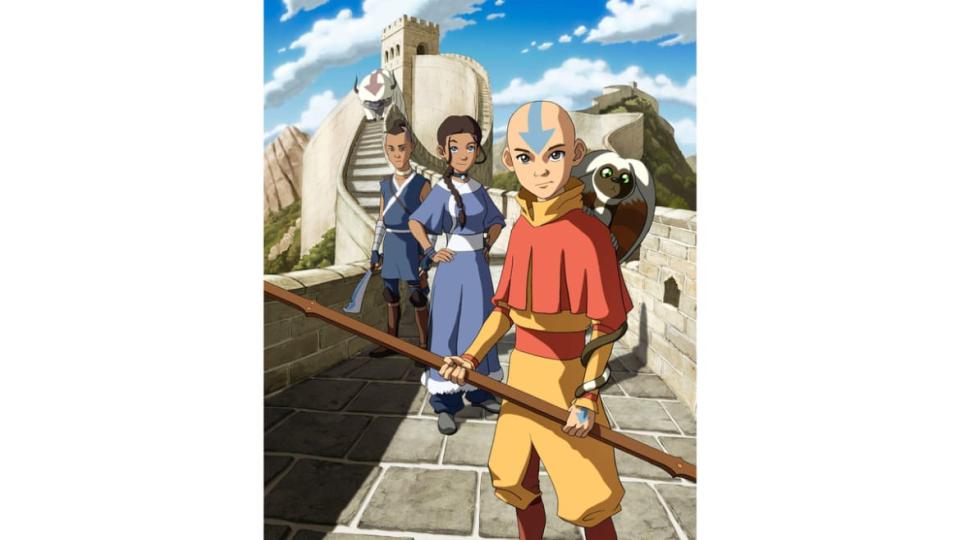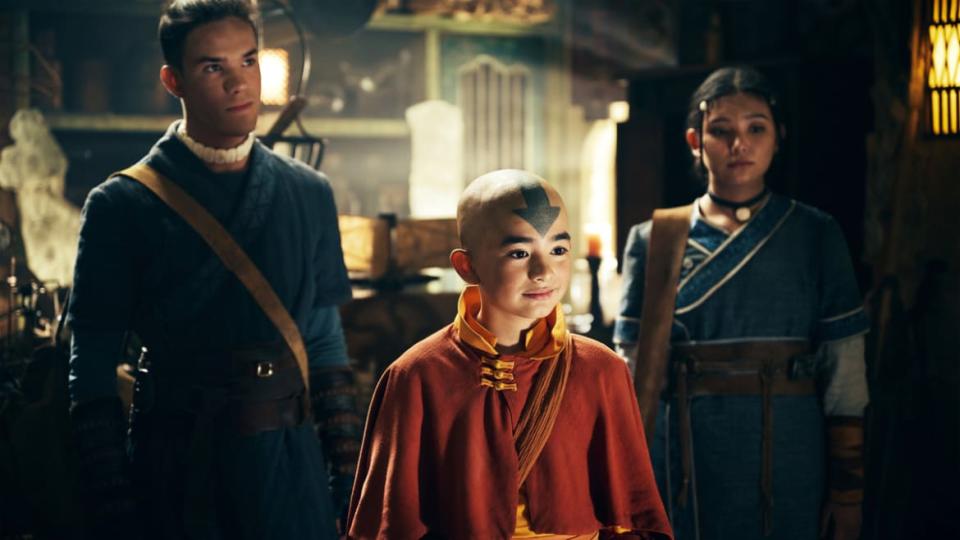Why Is Netflix’s ‘Avatar: The Last Airbender’ Remake Already Controversial?

- Oops!Something went wrong.Please try again later.
- Oops!Something went wrong.Please try again later.
- Oops!Something went wrong.Please try again later.
Fresh off the success of its One Piece adaptation, Netflix’s next cartoon-to-live-action series is Avatar: The Last Airbender, based upon the Nickelodeon cartoon that began airing in 2005. Beloved by fans for nearly 20 years, the adventures of Aang, a being known as the Avatar, and his friends have continued to be influential, spawning a sequel, comics, and even a (widely panned) movie adaptation.
But some recent statements by the live-action version’s showrunners have fans concerned about the upcoming remake. Here’s everything you need to know about Netflix’s Avatar: The Last Airbender, from its source material to its pre-release controversies.
What is Avatar: The Last Airbender?
Avatar: The Last Airbender, or simply ATLA, is set in a world split into four nations: the Water Tribe, the Earth Kingdom, the Fire Nation, and the Air Nomads. Certain people across the world can control their group’s associated element; these are known as the “benders.” Then there’s the Avatar, the sole being who can manipulate all four elements.
But at the beginning of the story, the Avatar is nowhere to be found. For the last century, the entire world has been at war due to aggression from the Fire Nation. The Air Nomads have been wiped out entirely as a result, while the remaining three nations try to fight back. But with the Avatar gone, protecting the peace feels like a lost cause.

The original Avatar: The Last Airbender cartoon.
That is, until a young waterbender, Katara, and her non-bender brother, Sokka, discover a boy frozen in an iceberg near their home. They quickly realize that the boy, an Airbender named Aang, is exactly who the world has been looking for all ths time: the Avatar. Together, the three travel the world in the hopes of defeating the Fire Nation.
The show’s continued popularity stems in large part from how it uses this foundation to explore themes like trauma, violence, and fascism. Although ATLA is aimed at a younger audience, its relatively nuanced portrayal of serious topics are a major part of its appeal.
Of course, Netflix’s live-action series will presumably also start at the beginning, so don’t worry too much if you’re not up to date on the world – you should get up to speed pretty quickly.
Besides the cartoon, what else is there in the ATLA-verse?
Netflix’s live-action series remake isn’t the only time that a studio has returned to the ATLA well. From books to comics to video games, the universe is no stranger to spinoffs and adaptations. The main ones to bear in mind, though, are the sequel series The Legend of Korra and the 2010 live-action film adaptation, written and directed by M. Night Shyamalan.
The Legend of Korra, which is set 70 years after the end of ATLA and follows Aang’s successor, was generally well received. Though it perhaps didn’t inspire the same kind of fervor as ATLA, viewers hailed it for its early portrayal of bisexual women. The show has even been credited with paving the way for more specifically LBGTQ+ focused shows, like She-Ra and the Princesses of Power.
The M. Night Shyamalan movie, The Last Airbender, was not so well received. Criticized before its release for casting white actors as characters whose backgrounds were inspired by Asian and Inuit cultures, it only got worse when the movie actually hit theaters. Both critics and audiences disliked its dry pacing, stilted dialogue, and poor visual effects. The film holds a “rotten” score of 5% on Rotten Tomatoes and continues to be widely mocked.
More popular have been the comics which built on the cartoon’s lore, released in a steady drip since 2011. They’ve allowed fans to peek into key questions left at the end of the show, which we won’t spoil here, as well as expanding its worldbuilding and fleshing out the connection between ATLA and Korra. There have also been several video games, from a mid-2000s action-adventure trilogy to a mobile turn-based RPG released last year.
No, it might not all have been of the same quality as the cartoon. But there’s been plenty to keep the franchise fresh, even nearly 20 years after Avatar’s initial release.
Are OG fans excited for—or worried about—Netflix’s adaptation?
Even before the show premiered, Netflix’s Avatar had developed a reputation. Burned once, some fans were hesitant when Netflix announced its adaptation in 2018. To make matters worse, original co-creators Michael Dante DiMartino and Bryan Konietzko left the production in 2020, citing a “lack of control” over making it how they envisioned, as well as “a negative and unsupportive environment.”
If that weren’t enough to give fans pause, Hollywood’s track record for its live-action adaptations of beloved cartoons would be. Some of these, like last year’s One Piece, have received strong reviews from fans and critics. But many others have been less successful with their fanbases. In 2017, fans and critics pilloried Death Note, an Americanized, campy, disastrous take on the beloved murder-mystery series.
Perhaps the most notable failure, however, was 2021’s Cowboy Bebop, based on the beloved ’90s anime. The sci-fi series received criticism for failing to translate the stylishness of the anime and, crucially, failing to meet the high standard set by its predecessor. Netflix canceled it after one season. Other offenders include Dragonball Evolution and Ghost in the Shell.
As the show nears its premiere, however, recent statements by the crew also have left some fans concerned. During the pre-release press rounds, showrunner Albert Kim, Katara actor Kiawentiio Tarbell and others have made comments that introduce many questions about what kind of adaptation Netflix’s Avatar will be.
In an interview with Entertainment Weekly, Tarbell explained that the live-action show “took out the element of how sexist” Katara’s brother Sokka was in the cartoon. Sokka’s actor, Ian Ousley, told EW that “there are things that were redirected just because it might play a little differently,” in the live-action version. But many fans worry that this change won’t take into account that Sokka’s character growth—which includes reckoning with his sexist behavior—is an important plot point in the original series.
In fact, the main characters growing as people is one of the keys to ATLA’s success as a whole. In the cartoon, Aang begins his journey as a happy-go-lucky kid, essentially shirking his duties as the Avatar. The beginning of the show sees the gang meandering from place-to-place in their weekly adventures. But each trip still spotlights some of the harm done by the Fire nation, gradually forcing Aang to come to terms with his responsibilities as well as organically showing the audience the story’s stakes.
Based on the cast and crew’s early comments, however, it doesn’t seem like that storytelling will translate to the live-action adaptation. Kim told IGN that the writers had to give Aang a “drive” from the start, taking the form of a vision that would avoid the “detours” of the early cartoon episodes.

(L to R) Ian Ousley as Sokka, Gordon Cormier as Aang, and Kiawentiio as Katara in Netflix’s The Last Airbender remake.
The bottom line is that Netflix’s ATLA isn’t designed to be a one-to-one remake of the cartoon. In fact, Kim has also said that the remake isn’t aimed at the cartoon’s fanbase. Instead, he told IGN that it’s meant to appeal to “people who are big fans of Game of Thrones” and not “just” kids, despite the cartoon’s wide-ranging appeal.
Existing ATLA fans are nervous that the remake may erase some of the nuances of the source material. But it’s tricky to tell from pre-release press how these apparent changes will land in context. More recently, Ousley told Metro that the “essence” of Sokka is, in fact, still in the show—and that “[he] definitely still gets humbled in ways and learns that women can be powerful.”
When does the show premiere, so we can judge for ourselves?
Ultimately, of course, the only way to know what impact these changes will have on Aang and friends is by watching the show itself. The live-action remake will begin streaming Feb. 22. Meanwhile, the original cartoon version is also streaming on Netflix, if you want to get a head start into the world of the Avatar.
Get the Daily Beast's biggest scoops and scandals delivered right to your inbox. Sign up now.
Stay informed and gain unlimited access to the Daily Beast's unmatched reporting. Subscribe now.

